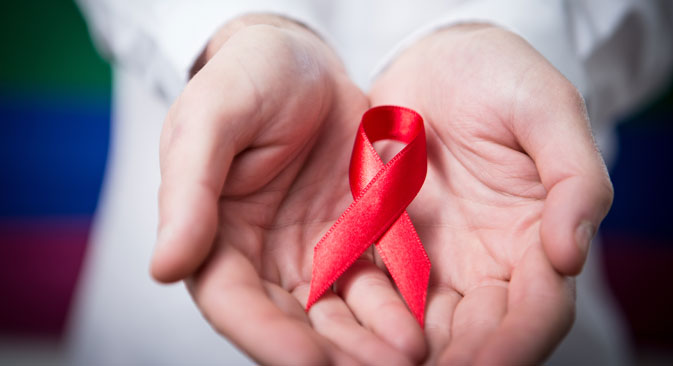
Today, migrants found to be HIV-positive are deported from Russia and banned from returning to the country. Source: Shutterstock
HIV-positive migrants may be able to continue living in Russia if new legislation is passed, reports the centrist newspaper Nezavisimaya Gazeta.
According to a draft law penned by the government, these migrants must not be deported if they have families in Russia and if they live in conditions that guarantee that they do not present a danger of infecting other people. The government has drawn up the draft law in compliance with a ruling by the Russian Constitutional Court. At the moment, migrants found to be HIV-positive are deported from Russia and banned from returning to the country.
Human rights activists have welcomed the bill, arguing that restrictions should be eased for migrants suffering from tuberculosis too.
“Russian citizens can live in the country with this diagnosis without infecting other people. So how are foreigners different? I think this diagnosis should not be a cause for separating families,” said deputy head of the Human Rights Council’s commission on migration policy Yevgeny Bobrov, adding that a similar bill should be drawn up concerning other infectious diseases among migrants, like TB, typhoid, and cholera.
However, many State Duma deputies are opposed to the bill. “Due to a shortage of funding, many villages and rural settlements are now left without any medical establishments of their own and people have to travel hundreds of kilometers to see a doctor,” said Vadim Solovyev, head of the legal service of the Communist Party of the Russian Federation.
“Furthermore, many hospitals and maternity clinics are filled with migrant laborers, who come to Russia to get medical treatment that is of good quality and is free of charge. Are they now suggesting that with this meager funding, we are now to treat HIV-positive migrants too?”
Early on Aug. 24, the dollar and the euro crossed yet another psychological barrier, reports the Vedomosti business daily. Within an hour of the Russian stock market opening, the dollar was trading at over 70 rubles, while the euro reached 81 rubles.
Russian markets are falling in the wake of global markets. On Aug. 24, the Shanghai Composite Index dropped by 8.5 percent, prompting China’s Xinhua news agency to describe the day as “Black Monday.”
The latest collapse on the Chinese market and falling oil prices are creating fears of a serious deterioration of the situation in the world economy in the near future and, as a result, a further decline in demand for commodities.
“The fall on Chinese stock exchanges, a selling spree on Western stock markets, the drop in the price of commodity contracts – all these are parts of the same process, which overall could be described as ‘a drop in demand for risk,’” said Anton Startsev, a senior analyst with the Olma investment firm.
The decline in China has spread to other markets too. In Japan, the Nikkei index fell by 4.6 percent and in Australia the S&P/ASX 200 tumbled 4.1 percent. In the UK, the FTSE 100, which includes many mining companies that heavily depend on Chinese demand, was down 2.9 percent at the start of trading, and Germany’s DAX by 3.1 percent. Meanwhile, the S&P 500 and Dow Jones futures are down by more than 2 percent.
As the crisis in their relations continues and the rivalry typical of the era of bloc confrontation is becoming relevant again, Russia and the West are returning to confrontation in the media sphere too, the business daily Kommersant reports.
Late last week, a NATO Strategic Communications Center opened in Riga, which has already been dubbed as a center “for combating Russian propaganda.” An increasing number of observers in Europe point out that Moscow’s potential has been underestimated and Moscow may win the information war against the West.
“We in Europe are shocked at how easily the Russian media switched to belligerent rhetoric, and this prevents us from feeling safe. Unfortunately, it is state TV that sets the tone in the Russian media, while quality independent outlets, which present an alternative view, find themselves under pressure from the authorities and simply unable to introduce some balance into the picture,” says former Polish Foreign Minister Jerzy Pomianowski, currently serving as the executive director of the European Endowment for Democracy.
Many critics of Moscow believe that efforts to counter Russian propaganda should be focused on creating a common European TV channel that would serve as an alternative to RT and existing Russian-language Western media.
In January, Latvian Foreign Minister Edgars Rinkēvičs told Kommersant that Latvia, Estonia, Lithuania, the UK and Denmark were discussing the idea of a pan-European Russian-language TV channel that would focus “on presenting facts, without comment or counterpropaganda, emotions or embellishments.”
“One has to admit that these days information is a particularly effective weapon targeting people’s minds. The Kremlin is expertly using it, distorting facts, using manipulation and seeking to instill in the minds of Russian people the image of the West as that of an enemy of Russia,” the Latvian Foreign Ministry said.
An attempt to raise funds necessary to launch a new European TV channel will be made at a donor conference scheduled to take place in Warsaw on Sept. 10.
All rights reserved by Rossiyskaya Gazeta.
Subscribe
to our newsletter!
Get the week's best stories straight to your inbox